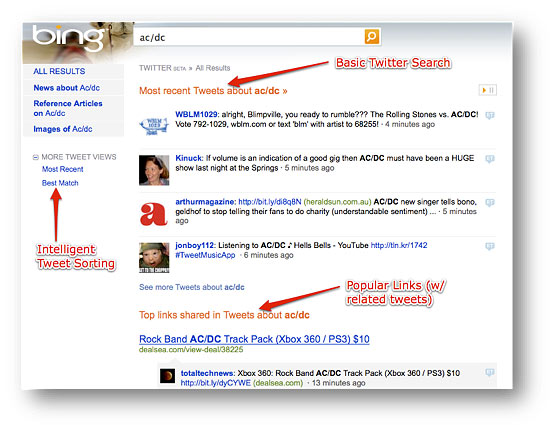Explaining Real-time Search to Clients
Everybody”s talking about real-time search. And not only to scream and shout about how Google Buzz sucks big time.
It”s because represents a tantalizing confluence of hot SEO topics: social media search = real-time search. But real-time search can also be frustrating to explain to clients, many of whom simply express a desire to dominate the real-time results… just like they want to be at the top of traditional search results pages.
Unfortunately, there doesn”t seem to be a magic bullet to ensure that your client”s message will be better represented in real-time search results than messages from competitors, or even worse, messages from people who really hate your brand and have an axe to grind.
We realize that the information below is by no means exhaustively comprehensive, but here”s how we explain real-time search to our clients at Promediacorp:
What is Real-time Search?
Real-time search allows people and companies to hear what the Internet is talking about, right now:
- For now, most real-time search results come from Twitter tweets
- Recently published news items may appear
- Some Facebook status updates are also included (News today that MySpace updates are also now included on Google)
- Some real-time search sites also include blog posts and content from various microblogging services (Friendfeed, Identica, Jaiku (still alive!), Bleeper, Google Buzz, etc.)
What are the most popular real-time search features? (example from Scoopler.com)
- Search through the latest tweets: This is the most common, simple search feature. Search for a keyword and all the latest mentions will appear before your eyes.
- Browse popular links posted by Twitter users: Many people find this more useful than simply looking at tweets. Rather than just showing you what people are saying about Lady Gaga, this will give you a list of the hottest, most-current links to Lady Gaga-related content.
- View media being mentioned on Twitter (images & video): If people are posting tweets with links to images and videos related to your search term, you”ll find that content here.
Three of the Top Real-time Search Engines
- Currently the king of real-time search
- Most people still tweet and search for tweets directly through Twitter
- Twitter has instant and complete access to all tweets
- Simply displays latest tweets related to search
- Big drawback is that search results are not ranked
- Twitter does not attempt to determine which tweets are most relevant and useful
 Google”s “Updates” & “Latest” Search Results
Google”s “Updates” & “Latest” Search Results
- Results are integrated into the main search results
- Position on search results page is based on how current Google believes the topic to be
- No real-time results will show on main search page when searching for topics that aren’t being heavily discussed on social media sites (“Frank Sinatra” search won’t automatically display real-time results, but a search for “Lady Gaga” probably will)
- Google integrates news and blog posts into “Latest” real-time results, while selecting “Updates” limits results to Twitter, Buzz, MySpace, etc. (add “site:google.com” to view only Google Buzz posts; use “site:myspace.com” to view only MySpace updates)
 Bing Twitter (Is that name awkward or what?)
Bing Twitter (Is that name awkward or what?)
- Deal with Twitter supposedly allows full access to real-time tweets… but tweets go through filters at Bing, so results are a few minutes older than at Twitter.com
- “Top links” feature shows popular links along with referring tweets
- Posts can be sorted by “most recent” or “best match”. “Best match” shows posts from most followed users along with heavily retweeted posts.
The Good & The Bad of Real-time Search
Good:
- Monitor what people are saying right now about your brand
- Engage your customers directly
- Respond immediately to sensational news and controversy
- Increase your brand”s Twitter/Facebook following
- Increase your brand’s official presence in search results through the use of popular keywords in social media content
Bad:
- Tweets from upset customers and detractors will also appear in real-time search results
- Real-time search is currently still very susceptible to
- Speed required for effective tweeting means your client must give up some control over the marketing message. There is no time for a “measured response” in real-time search.
Real-time Search Strategies (suspiciously similar to social media strategies, eh?)
1. Develop social media personalities around your brand, for example:
- The brand’s spokesperson/manager
- The “ultimate fan”
- The webmaster
- Etc., etc. according to client”s needs
2. Listen to the conversation
- Actively monitor what people are saying about your brand through the use of various real-time search engines and monitoring tools.
3. Engage in the conversation
- Be proactive. Provide your audience with interesting news and links to entertaining content. Tell them what’s going on with your brand.
- Be reactive. When appropriate, respond to unfounded rumors, slander, hoaxes, etc.
BOTTOM LINE: A dedicated, full-time effort is needed to engage in, monitor and respond to the real-time conversation going on about your brand. Real-time search means it”s more important than ever to devise and follow a social media strategy.
Anybody out there have any other tips for explaining real-time search to clients?



[…] One of the many facets of being an Agency is educating clients. In the ever evolving world of Internet Marketing, the better clients are educated, the better they understand what you’re trying to do. However, education of a client is no easy task, but fear not, Michael Manning explains all, and tells us just how to explain real-time search to clients. […]
[…] One of the many facets of being an Agency is educating clients. In the ever evolving world of Internet Marketing, the better clients are educated, the better they understand what you’re trying to do. However, education of a client is no easy task, but fear not, Michael Manning explains all, and tells us just how to explain real-time search to clients. […]